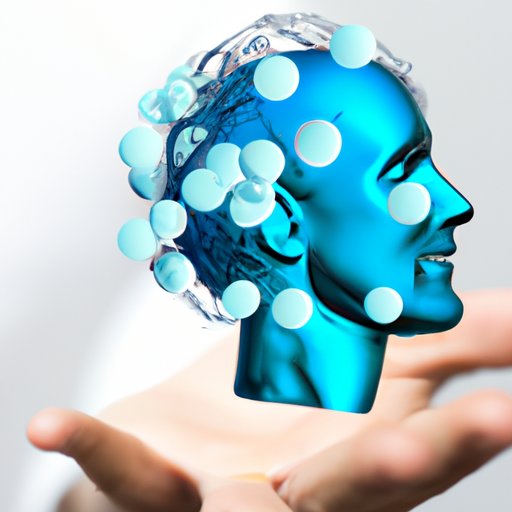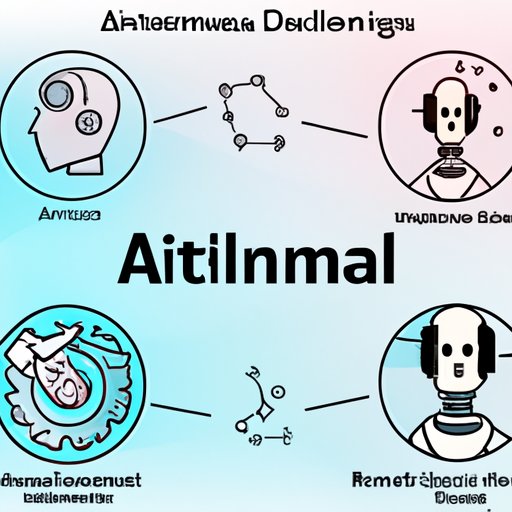Introduction
Artificial intelligence (AI) has been at the forefront of technological advances in recent years. From self-driving cars to virtual assistants, AI is being used in more and more ways to make our lives easier and more efficient. But what exactly is AI? This article will explore the basics of AI, its history, current trends, implications for businesses and society, and potential future developments.
Exploring the Basics of Artificial Intelligence: What is AI?
At its core, artificial intelligence is a branch of computer science that focuses on creating intelligent machines capable of performing tasks that would typically require human intelligence. AI systems are designed to learn from their environment and adapt to new inputs and situations. AI can be divided into two main categories – narrow AI and general AI. Narrow AI, also known as “weak AI”, is focused on performing specific tasks, such as facial recognition or language translation. General AI, or “strong AI”, is focused on creating systems with the capability to think and reason like a human being.
There are several different types of AI, including machine learning, deep learning, natural language processing, and robotic process automation. Machine learning is a type of AI that utilizes algorithms to analyze data and identify patterns. Deep learning is a subset of machine learning that uses neural networks to enable machines to learn more complex tasks. Natural language processing enables machines to understand and interpret human language. Robotic process automation is the use of software robots to automate repetitive tasks.
Examples of AI in action include autonomous vehicles, virtual assistants, facial recognition technology, and automated customer service chatbots. AI is also being used in healthcare, finance, retail, and other industries to improve efficiency and accuracy.

A Comprehensive Guide to Artificial Intelligence
The concept of artificial intelligence has been around since the 1950s, but it wasn’t until the late 2000s that AI began to gain traction. In the early days of AI, computers were limited in their abilities and could only perform simple tasks. However, with advancements in computing power, AI has become much more sophisticated and can now be used to tackle complex problems.
The benefits of AI are numerous, including increased efficiency, improved accuracy, and cost savings. However, there are also some challenges associated with AI, such as privacy concerns and algorithmic bias. It is important to consider these issues when implementing AI solutions.
In recent years, there has been a surge in the development of AI-powered solutions and services. AI is being used to automate mundane tasks, such as data entry and customer service, and to create more personalized experiences for customers. Additionally, AI is being used in business decision making to help companies make better decisions faster.

The Growing Impact of Artificial Intelligence on Society
The impact of AI on society is profound. On an economic level, AI is expected to create new jobs and increase productivity. On a social and cultural level, AI is transforming how we interact with each other and our environment. Finally, there are legal and ethical implications of AI that must be considered, such as privacy concerns and the potential for autonomous weapons.
In terms of economics, AI is expected to have a positive impact. According to a report by PwC, AI could add up to $15.7 trillion to the global economy by 2030. AI is also expected to create new jobs in areas such as data analysis and machine learning, while automating mundane tasks and increasing productivity.
On a social and cultural level, AI is changing how we interact with each other and our environment. AI-powered virtual assistants, such as Amazon Alexa and Google Home, are becoming increasingly popular and are transforming how we access information and communicate with each other. Additionally, AI is being used to improve public safety, such as facial recognition technology which can be used to identify criminals.
Finally, there are legal and ethical implications of AI that must be taken into account. Privacy concerns are a major issue, as AI systems are capable of collecting and analyzing large amounts of personal data. Autonomous weapons, such as drones and robots, are another area of concern, as they raise questions about who is responsible for the actions of these machines.

How AI Is Changing Business and Industry
AI is having a profound impact on business and industry. Automation is one of the most significant changes brought about by AI, as it allows companies to automate mundane tasks and improve efficiency. AI-powered solutions and services are also becoming increasingly popular, as they enable companies to provide more personalized experiences for customers.
AI is also playing an increasingly important role in business decision making. AI-powered analytics tools can be used to identify patterns in data and make better decisions faster. Additionally, AI can be used to optimize processes and maximize profits.
The Future of Artificial Intelligence
The potential benefits of AI are vast, but there are also risks and challenges that must be addressed. As AI continues to become more sophisticated, it is important to consider the potential implications of AI on society and the economy. Additionally, new developments in AI, such as quantum computing, could have far-reaching implications.
Overall, the future of AI looks bright. AI is already being used in numerous industries, and its potential applications are virtually limitless. New technologies, such as quantum computing, could unlock even greater possibilities for AI. It is important to keep in mind, however, that AI does come with risks and challenges that must be addressed.
Artificial Intelligence and Robotics: A Beginner’s Guide
Robotics is closely related to AI, as it involves the use of machines that are programmed to perform certain tasks. Robotics has many advantages, such as increased efficiency and accuracy, as well as cost savings. However, there are also some disadvantages, such as the potential for job losses and the risk of errors.
Examples of robotics in action include self-driving cars, manufacturing robots, and medical robots. Self-driving cars are equipped with sensors and cameras to enable them to detect their surroundings and navigate autonomously. Manufacturing robots are used to automate tedious tasks and reduce costs. Medical robots are being used to assist surgeons in performing delicate procedures.
Ethical Considerations for Artificial Intelligence
As AI becomes more sophisticated, it is important to consider the ethical implications of this technology. Privacy concerns are a major issue, as AI systems are capable of collecting and analyzing large amounts of personal data. Autonomous weapons, such as drones and robots, are another area of ethical concern, as they raise questions about who is responsible for the actions of these machines.
Algorithmic bias is another ethical issue that must be addressed. AI systems are not perfect and can be biased if the underlying datasets are incomplete or inaccurate. It is important to ensure that AI systems are tested and validated to eliminate any potential biases.
Conclusion
In conclusion, artificial intelligence is a rapidly evolving field with tremendous potential. From self-driving cars to virtual assistants, AI is being used in more and more ways to make our lives easier and more efficient. AI is also having a profound impact on business and industry, as it is being used to automate mundane tasks and improve decision making. Finally, it is important to consider the ethical implications of AI, such as privacy concerns and algorithmic bias.
As AI continues to evolve, it is important to remain mindful of the potential risks and challenges associated with this technology. With careful consideration and responsible implementation, AI has the potential to revolutionize our lives and transform our world.
(Note: Is this article not meeting your expectations? Do you have knowledge or insights to share? Unlock new opportunities and expand your reach by joining our authors team. Click Registration to join us and share your expertise with our readers.)
